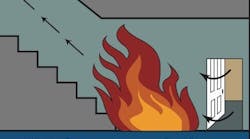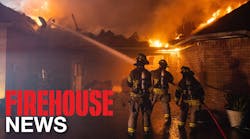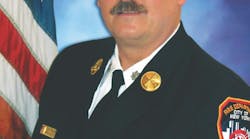Chief Thomas N. Tippett suddenly resigned when the financial control board that supervises the city's budget rejected his actions in restoring a fifth firefighter to ladder companies and bringing back the position of aides to battalion chiefs. Tippett had made these and other moves to implement recommendations that came out of the investigations of two fires that had taken the lives of three firefighters.
A veteran of 32 years on the DCFD and a former union president, Tippett had been named "interim" chief last December after the previous chief resigned under pressure from Mayor Anthony Williams for not moving fast enough to bring about the changes recommended in those reports. The mayor gave Tippett a mandate to end the delays and promised to back him up with the financial and political support he needed to make things happen.
It was a formidable task. Over a period of several years, the DCFD's annual budget had been slashed 30% and its manpower cut by 25%. The staffing of engine and truck companies had been reduced from five to four, battalion chiefs' aides were eliminated, several companies had been closed while apparatus, stations and equipment fell into disrepair. The fire department - which had been one of the few local agencies that did its job - was in danger of becoming as dysfunctional as the rest of the city government.
Tippett moved quickly and decisively to carry out his mandate from the mayor. He used $4 million that had been budgeted for overtime to pay for the restoration of the fifth man on the department's 16 ladder trucks and the six battalion aides positions. His proposed 2001 budget included a request for an additional $6 million to fund these positions on a permanent basis. He reopened a busy firehouse that had been closed and proceeded with plans to cross-train the entire department for firefighting and EMS, create paramedic engine companies and expand the overworked emergency ambulance service. A massive order for new apparatus, improved SCBAs and other safety equipment was to be delivered by the end of the year.
Firefighter morale, which had been at a low ebb, picked up as Tippett made his moves. In just the last few months, there were several fires in which the fifth truckmen had made a difference in rescuing the occupants of smoke-filled buildings and at least two incidents in which battalion chiefs' aides had spotted danger and relayed critical information that prevented firefighters from being injured or killed.
There was grumbling from some city council members who want to continue saving money at the expense of the fire department and use if for other projects, or to build up the city's cash reserve, or to give the citizens an election-year tax cut. But the real trouble came when Mayor Williams went to the financial control board with a request that they re-program this year's budget to provide funds for the additional truckmen and chiefs' aides. They turned him down and Tippett immediately resigned - as he had warned he would do if they didn't provide the money.
In his letter of resignation, Tippett pointed out that understaffed ladder trucks and the lack of chiefs' aides had been cited in two fire reports as being "major factors that may have contributed to firefighter fatalities." He added: "I have made a solemn promise to the firefighters of this city and to their families that I would do everything in my power to improve safety and not unnecessarily place my employees in harm's way. Therefore, I cannot in good faith carry out the directive."
The firefighters rallied around Tippett and directed their anger at the financial control board, which was created by Congress to impose some fiscal discipline on the District government and bring order out of the chaos that has come to characterize its operations. The five-member board is appointed by the President and serves without pay. Under this system, all spending has to be reviewed and approved by the control board before the city's budget is sent to Congress for final approval.
The board is headed by Alice Rivlin, a highly respected economist who had been the Clinton administration's budget director and was the first director of the Congressional Budget Office. She explained to Firehouse® that the issue was not the merits of the five-man ladder trucks or the chiefs' aides, but whether Tippett had followed proper procedures. "The orderly way to do it would have been through the 2001 budget," Rivlin said. "… In the middle of this fiscal year, the fire chief asked for permission after the fact … and there was no money for it in this budget."
As this is written, Local 36 of the International Association of Firefighters (IAFF) is working with city council members to find money in the current budget to pay for the fifth truckmen and the chiefs' aides and to make sure it's included in the 2001 budget that mayor and the council have to send to the control board and Congress this month. Several members of Congress who serve on committees that oversee the District of Columbia government have said they will support the firefighters.
Also, as this is written, the mayor has promised to name a new fire chief within the next few days. The search committee reportedly had narrowed it down to three finalists from other cities. However, it's difficult to understand why an outside chief would accept a job where he's not wanted by the rank-and-file firefighters and where he has to answer to four different masters - the mayor, the city council, the control board and the congressional committees. And, with all of that, there's no guarantee he'll get the money and support he needs to do the job. Why would anyone in his right mind want to be chief of the District of Columbia Fire Department?
In fact, that's the first question I'm going to ask the new chief, whoever he may be.
Hal Bruno, a Firehouse® contributing editor, retired as political director of ABC News and served 40 years as a volunteer firefighter. He is a member of DCFD's Friendship Fire Association and an honorary member of Local 36, International Association of Firefighters (IAFF).




